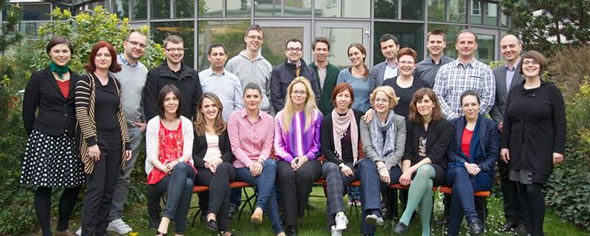Brussels – ESI on the future of enlargement

ESI Senior Analyst Alexandra Stiglmayer briefed 20 young government officials from the Western Balkans on the need to re-energise and reinforce the enlargement process over the coming period. The government officials are fellows of the European Fund for the Balkans and just completed three-month fellowships in EU ministries and state institutions. Alexandra spoke to them during their final seminar in Brussels.
She remarked that the next Enlargement Commissioner, who is due to take office in November 2014, will face a tough challenge: support for enlargement is low following the EU's economic crisis and the gains that EU-sceptical, non-traditional parties made in in the recent European Parliament elections in several EU member states (UK, France, Denmark and Greece). At the same time, the new Enlargement Commissioner will not be able to welcome any new country into the EU since none of the three countries currently negotiating accession (Montenegro, Serbia, Turkey) is likely to join the EU during the term of the next Commission (2014-2019).
It is therefore important that the European Commission strengthens the process. Alexandra said that this requires the following:
- The Commission should clarify and publicise the key requirements under each chapter of the acquis, so that each country – the negotiating countries, the candidates (Albania and Macedonia) and the "potential" candidate countries (Bosnia and Kosovo) – has a roadmap towards the end goal;
- The Commission should clarify and publicise the criteria for the fulfilment of the political and economic Copenhagen criteria – what are the criteria for stable institutions guaranteeing democracy, the rule of law, human rights, protection of minorities, a functioning market economy and the ability to cope with competitive pressure and market forces within the EU?;
- The Commission should establish and publicise the indicators and benchmarks for the fulfilment of all the requirements.
- All of this should be done in clear language that can be understood by non-experts.
Monitoring of progress should be done in the same way for the seven countries so that it becomes visible where each of them stands in the process and in comparison with the others.
Alexandra said that this would have several positive benefits:
- Progress reports would become much more understandable and clear, triggering debates and soul-searching in the enlargement countries - very much like the publication of the OECD's PISA results does in the 65 participating countries (PISA measures the intellectual capabilities of 15-year old students);
- Political leaders and civil servants in the enlargement countries would clearly see the results of their work, which would motivate them;
- Other stakeholders such as NGOs would be able to follow progress and get involved;
- Potential investors would be able to form their opinion about investment opportunities;
- EU member states would be able to see how the Commission arrives at assessments and conclusions, which would increase their confidence in the enlargement process;
- The European Commission would be empowered.
Further reading: Enlargement reloaded – ESI proposal for a new generation of progress reports (January 2014)
